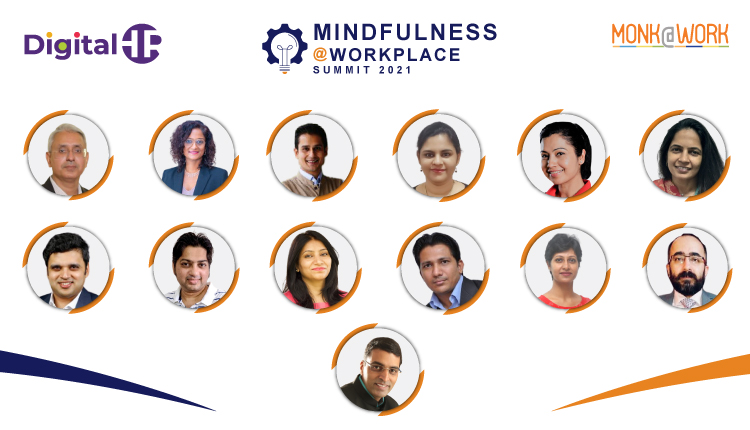Constant peer pressure and monotonous routine make the workspace a bit overwhelming. This not only hampers the productivity, but also the mental health of the employees. Thus, practicing mindfulness in the workplace is extremely crucial to bring back the lost motivation.
DigitalHR’s recently hosted a webinar on the “MINDFULNESS@WORKPLACE SUMMIT” which witnessed discussions on how one can stay focused yet flexible by practicing mindfulness as it helps in reprogramming the mind, relaxing it, and thinking in a healthier, smoother, and less stressful way.
The notable speakers were Dr. Faisal Nadeem Saiyed, Senior Director, Apac People Team, Expedia Group, Janet James, Head Of Organization And Leadership Development, Aster Dm Healthcare, Dr. Karan Thakur, Vice President, Operations & Communications, Indraprastha Apollo Hospitals, Katyayani Krishna, Area HR Head, South Asia, Maersk, Komal Sodhi, Founder, Komal Yoga And Fitness, Prachi Rastogi, Diversity And Inclusion Leader, APAC IBM, Raj Kishan Mallavarapu, Apac Head Of Digital Capabilities And Change Bayer Crop Science, Rishi Dhand, Group Product Leader – Google Payments, Saumil Mehta, Country Head, Kraft Heinz India, Sarabsri Kaur, Instructor – UCLA Mindfulness, Awareness Research Centre, Sebati Iyengar, People And Organisation Director, Royal Canin, Sumit Katyal, Regional Leader Pension & Benefits – APAC At GE, And Sapan Shrimal, Director, Monk@Work.
The moderator of the event was Sapan Shrimal, the Director of Monk@Work. He said that during the pandemic, people realized how mindfulness gained sudden prominence. While people still talk about mindfulness, it only comes to wellness. It is good but there are other parts that are getting overshadowed.
The next speaker in the row was Prachi Rastogi, Diversity And Inclusion Leader, APAC IBM. as per her views, people have suffered from a lot of anxiety, stress; thinking about what is going to happen in the future. Mindfulness was always the mainstream for the organizations although corona may have accelerated it, it was definitely there much before that.
Sebati Iyengar, People And Organisation Director, Royal Canin, then takes her turn to speak. She said that on the very onset, wellbeing is integral to how businesses operate. Leaders really needed to know what is mental health all about. Sometimes the intent might be there, but the language is missing.
The panel is then joined by Dr. Karan Thakur, Vice President, Operations & Communications, Indraprastha Apollo Hospitals. He says that we need to put up mindfulness against wellness. Few people think that mindfulness is equal to wellness, while some of them consider mindfulness is greater than wellness. These are some of the paradigms that come into discussion when you look at mindfulness and wellness and try to chart out the future.
The panel is then joined by Komal Sodhi, Founder, Komal Yoga and Fitness. Being a yoga expert, she suggested people focus on mindful meditation which is crucial for mental well-being and controlling our emotions. This kind of meditation is also known as mental noting. Sodhi then asked the panel to practice mindfulness by relaxing and meditating for a while.
Janet James, Head Of Organization And Leadership Development, Aster DM Healthcare then discusses mindfulness and its importance by sharing her screen space. She says that depression and anxiety are the main causes of lost productivity in the global economy and that is where the need for mindfulness practice arises. There are loads of research studies that link to the fact and show how mindfulness increases employee engagement.
Next, the panel is joined by Sumit Katyal, Regional Leader Pension & Benefits – APAC at GE who focuses on the quest for depth that pervades all the aspects of our lives. Deep work links up with mindfulness and has a strong impact on our personal and professional lives.
The summit sees a new turn as Katyayani Krishna, Area HR Head, South Asia, Maersk, joins in. she says that a mind is like a parachute. It doesn’t work if it is closed. Thus, mindfulness is the only key to open up your mind. It helps in unleashing the potential of our people.
Rishi Dhand, Group Product Leader – Google Payments, shares her experience as a product manager. Being a Product Manager, he has realized that the ability to build a strong relationship is based on certain intrinsic skills, and that is where empathy, mindfulness, emotional intelligence comes into play.
Next, the discussion is joined by Raj Kishan Mallavarapu, Apac Head Of Digital Capabilities And Change Bayer Crop Science. He says that we are currently going through a connection crisis. Probably we have more smartphones than people in the world. We cut off our loneliness by spending more time on the tech. This is where interpersonal mindfulness comes in which focuses on the importance to pay attention to others and have emotional awareness.
The conversation is then initiated by Saumil Mehta, Country Head, Kraft Heinz India. As per his opinion, mindfulness is not an alien concept. It has its own history. Mindfulness today is more relevant because of the distractions that people. To avoid these distractions, practicing mindfulness is crucial.
Working from home has made the concept of mental wellness one of the most centered discussions. Mindfulness has always been a stream and we have been flowing around it. Mindfulness is not just a trend but it has been always there and yet less talked about, which is highlighted by Dr. Faisal Nadeem Saiyed, Senior Director, Apac People Team, Expedia Group.
The last speaker of this amazingly power-packed webinar is joined by Sarabsri Kaur, Instructor – UCLA Mindfulness, Awareness Research Centre. She says that our emotions and leadership skills come in our way to be mindful. This is something happening in our daily lives. One can understand this by driving all the attention to the body and mind.
Bringing the practice of mindfulness in a particular workplace has the ability to decrease people’s anxiety and stress through heightened awareness. This, in turn, leads to increased productivity. Mindfulness also encouraging engagement and most importantly form a leadership perspective.






